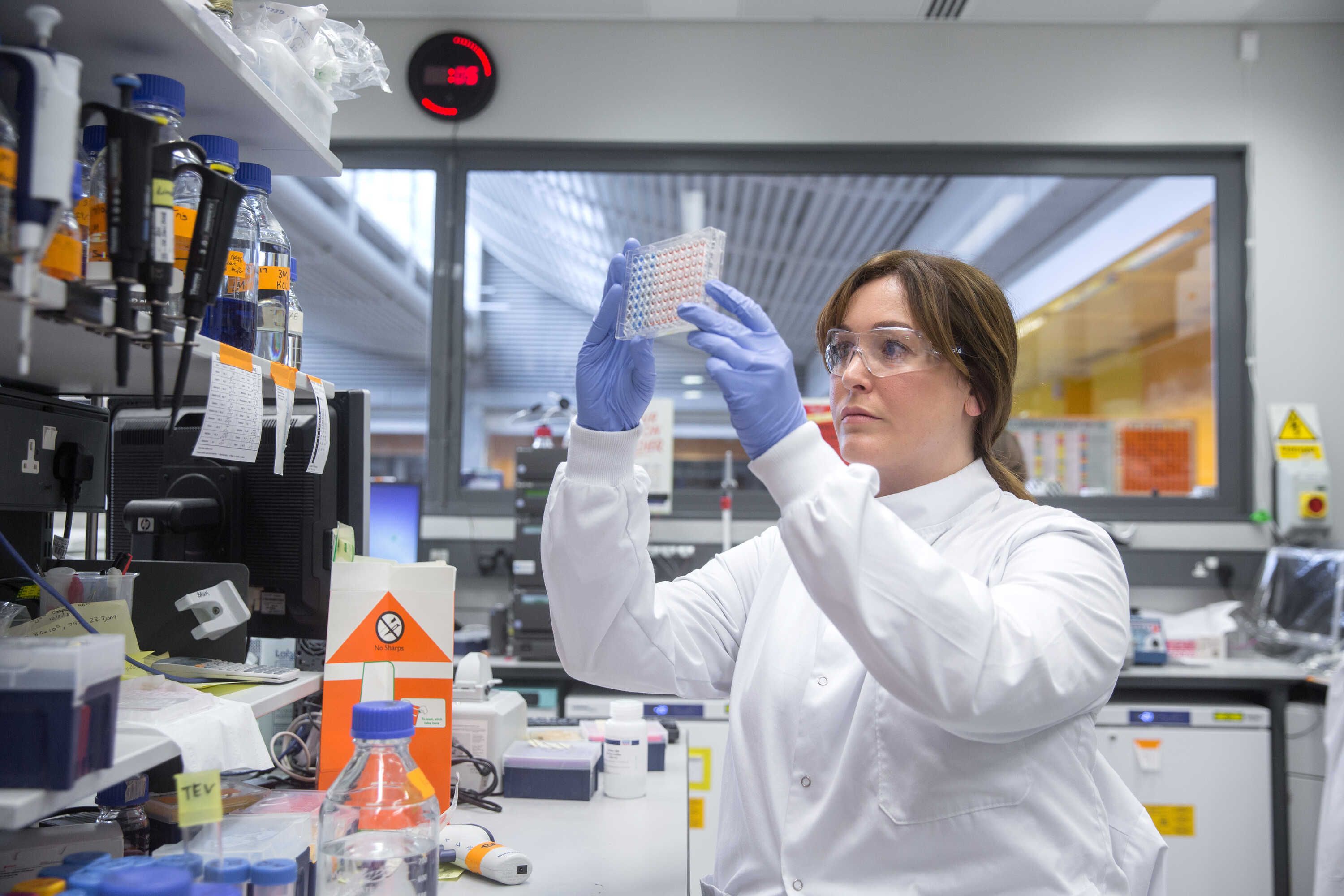
Structural Biology
Train in major structural biology techniques for a career in research.
Receive training in structural biology for a career in research
Build laboratory and computational- skills to understand how biological function derives from structure
Develop your research expertise in a single, in-depth research project
Course key facts
-
Qualification
-
MRes
-
-
Duration
1 year
-
Start date
September 2025
-
Study mode
Full-time
-
Fees
£15,500 Home
£38,600 Overseas
-
Delivered by
-
Location
-
South Kensington
-
Minimum entry standard
-
2:1 in a physical sciences-based subject, including biochemistry, molecular biology, or similar.
Course overview
Build skills towards a successful career in research on this Master's course, which specialises in structural biology.
You'll receive in-depth training of structural biology techniques.
Knowing the structure of a protein is vital to understanding how the protein works.
This course will provide an overview of the techniques used to derive biological function from structure.
You'll become familiar with the macromolecular structural determination techniques needed for success.
Extensive laboratory-based research will provide opportunities to learn skills in areas including biological NMR, X-ray crystallography, cryoEM, and structural bioinformatics.
You'll also consolidate your learning through workshops on topics from time management to clarity in writing.
The course immerses you in a research environment and includes networking by organising talks from structural biology researchers from outside of Imperial.
Structure
This page is updated regularly to reflect the latest version of the curriculum. However, this information is subject to change.
Find out more about potential course changes.
Please note: it may not always be possible to take specific combinations of modules due to timetabling conflicts. For confirmation, please check with the relevant department.
This MRes centres around a single, year-long research project. All assessments are courseworks associated with the project taking you from writing a Literature Review through a mock Grant Proposal to a final Research Report. These are split across three core modules.
- Introduction to Structural Biology
- Skills for Success in Structural Biology Research
- Research Project in Structural Biology
Below are examples of subject areas conducted by supervisors:
- Membrane protein structure-function
- Human disease and infection
- Photosynthesis and bioenergetics
- Transcriptional regulation and mechanism
- Enzyme catalysis
- Macromolecular machines
Teaching and assessment
Teaching and learning methods
-
Class-based lectures
-
Computer labs
-
Literature dissertation
-
Training in structural bioinformatics
-
Individual lab research projects
-
Web tools for the analysis of protein sequences and structures
Balance of assessment
Key
- Research project one
- Literature dissertation and research project two
- 50% Research project one
- 50% Literature dissertation and research project two
Assessment methods
-
Individual research project reports
-
Laboratory performance
-
Oral presentations
-
Oral assessments
Entry requirements
We consider all applicants on an individual basis, welcoming students from all over the world.
How to apply
Apply online
You can submit one application form per year of entry. You can choose up to two courses.
Application deadlines – Round 1 closes on Thursday 16 January 2025
We operate a staged admissions process with several application rounds throughout the year.
Apply by 23.59 (UK time) on the closing date of an application round, to ensure you receive a response on your application by the relevant decision date.
Application rounds
Round 1
- Apply by Thursday 16 January 2025
- Decision by Thursday 6 March 2025
Round 2
- Apply by Thursday 27 March 2025
- Decision by Thursday 1 May 2025
Round 3
- Apply by Thursday 15 May 2025
- Decision by Thursday 17 July 2025
There is no application fee for MRes courses, Postgraduate Certificates, Postgraduate Diplomas, or courses such as PhDs and EngDs.
If you are applying for a taught Master’s course, you will need to pay an application fee before submitting your application.
The fee applies per application and not per course.
- £80 for all taught Master's applications, excluding those to the Imperial College Business School.
- £100 for all MSc applications to the Imperial College Business School.
- £150 for all MBA applications to the Imperial College Business School.
If you are facing financial hardship and are unable to pay the application fee, we encourage you to apply for our application fee waiver.
Find out more about how to apply for a Master's course, including references and personal statements.
Unless you are from an exempt nationality, you will need an ATAS certificate to obtain your visa and study this course.
Nationals from the following countries are exempt: Switzerland, Australia, Canada, Japan, New Zealand, Singapore, South Korea, USA and EEA members.
Use this information when applying for an ATAS certificate to study this course:
- CAH code: CAH03-01-02
- Descriptor: biology (non-specific)
- Supervisor name: Professor Daniel Davis
Get guidance and support for obtaining an ATAS certificate.
Tuition fees
Home fee
2025 entry
£15,500
You should expect and budget for your fees to increase each year.
Your fee is based on the year you enter the university, not your year of study. This means that if you repeat a year or resume your studies after an interruption, your fees will only increase by the amount linked to inflation.
Find out more about our , including how inflationary increases are applied to your tuition fees in subsequent years of study.
Whether you pay the Home or Overseas fee depends on your fee status. This is assessed based on UK Government legislation and includes things like where you live and your nationality or residency status. Find out .
If you're a UK national, or EU national with settled or pre-settled status under the EU Settlement Scheme, you may be able to apply for a from the UK government, if you meet certain criteria.
For courses starting on or after 1 August 2024, the maximum amount is £12,471. The loan is not means-tested and you can choose whether to put it towards your tuition fees or living costs.
The loan is not means-tested and you can choose whether to put it towards your tuition fees or living costs.
Overseas fee
2025 entry
£38,600
You should expect and budget for your fees to increase each year.
Your fee is based on the year you enter the university, not your year of study. This means that if you repeat a year or resume your studies after an interruption, your fees will only increase by the amount linked to inflation.
Find out more about our tuition fees payment terms, including how inflationary increases are applied to your tuition fees in subsequent years of study.
Whether you pay the Home or Overseas fee depends on your fee status. This is assessed based on UK Government legislation and includes things like where you live and your nationality or residency status. Find out how we assess your fee status.
If you're a UK national, or EU national with settled or pre-settled status under the EU Settlement Scheme, you may be able to apply for a Postgraduate Master’s Loan from the UK government, if you meet certain criteria.
For courses starting on or after 1 August 2024, the maximum amount is £12,471. The loan is not means-tested and you can choose whether to put it towards your tuition fees or living costs.
The loan is not means-tested and you can choose whether to put it towards your tuition fees or living costs.
How will studying at Imperial help my career?
Learn the skills necessary to pursue a career in structural biology, whether it's in academia or industry.
Skills workshops will also improve your expertise in networking, time management, writing, and wellbeing.
Life Sciences graduates from Imperial are also highly sought after in a variety of employment sectors.
Life Sciences graduates from Imperial are also highly sought after in a variety of employment sectors.
Other potential career options include banking and finance, education, and manufacturing.
Further links
Contact the department
- Email: l.barron@imperial.ac.uk
Course Director: Dr Morgan Beeby
Course Administrator: Lucy Barron
Visit the Department of Life Sciences website.

Request info
Find out more about studying at Imperial. Receive updates about life in our community, including event invites and download our latest Study guide.

Events, tasters and talks
Meet us and find out more about studying at Imperial.

Terms and conditions
There are some important pieces of information you should be aware of when applying to Imperial. These include key information about your tuition fees, funding, visas, accommodation and more.
You can find further information about your course, including degree classifications, regulations, progression and awards in the programme specification for your course.
Programme specifications